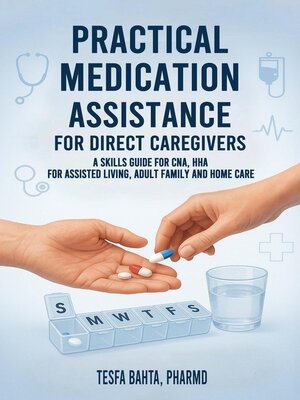Practical Medication Assistance for Direct Caregivers
ebook ∣ A Skills Guide for CNA, HHA for Assisted Living, Adult Family and Home Care
By Tesfa Bahta

Sign up to save your library
With an OverDrive account, you can save your favorite libraries for at-a-glance information about availability. Find out more about OverDrive accounts.
Find this title in Libby, the library reading app by OverDrive.



Search for a digital library with this title
Title found at these libraries:
| Library Name | Distance |
|---|---|
| Loading... |
Medication management is one of the most critical responsibilities in caregiving, and mistakes can have life-changing consequences. 'Practical Medication Assistance for Direct Caregivers' equips Certified Nursing Assistants, Home Health Aides, and unlicensed caregivers with the essential knowledge and skills to provide safe, ethical, and effective support in assisted living and home care settings.
Based on his pharmacist and educator experience, Tesfa Bahta offers a clear and accessible guide that combines technical instruction with compassionate practice. Readers will learn the fundamentals of medication assistance, including avoiding common errors, safe handling procedures, infection control, and strategies for preventing adverse side effects. The book explains how to support residents in self-administering their medications while respecting autonomy vand maintaining compliance with state laws.
Beyond the practical steps, Bahta underscores the ethical and legal responsibilities that define high-quality caregiving. From accurate documentation to effective communication with healthcare professionals, caregivers are guided in creating an environment prioritizing safety, dignity, and trust. The book also explores modern tools such as electronic medication records and automated dispensers, preparing caregivers for the evolving demands of healthcare.
Both a reference and a training resource, 'Practical Medication Assistance for Direct Caregivers' empowers caregivers to perform with confidence, professionalism, and compassion. It affirms their critical role in safeguarding the health and well-being of those they serve.







